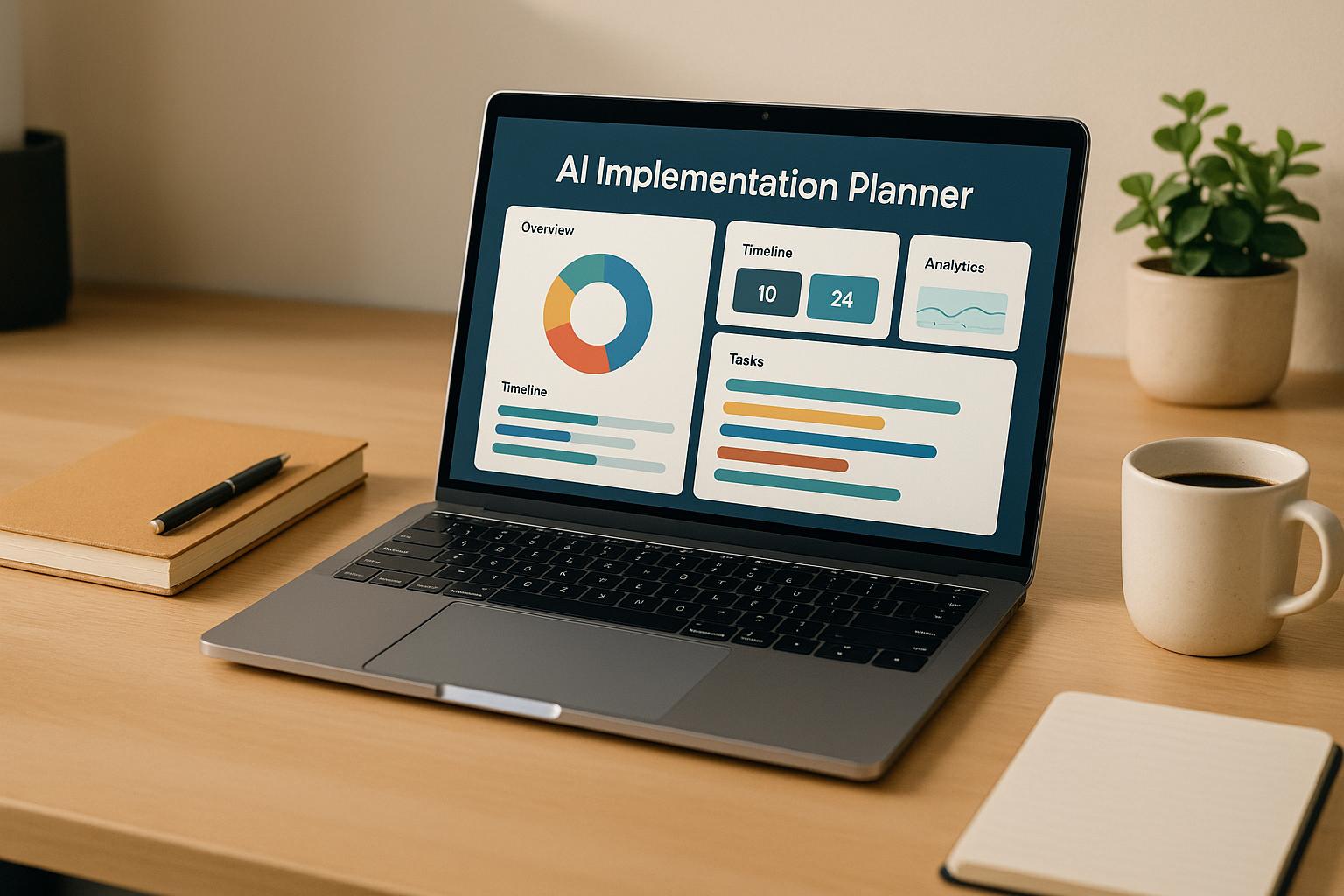
AI Agents Are Transforming Business Operations: What Your Company Needs to Know | Digital Fractal
The artificial intelligence landscape is evolving at breakneck speed. What began as simple chatbots and content generators has rapidly matured into something far more powerful: autonomous AI agents capable of executing complex business workflows from start to finish.
At Digital Fractal, we’re witnessing this transformation firsthand as our clients transition from using AI as a support tool to deploying it as an operational powerhouse. The shift isn’t coming—it’s already here.
The Data Behind the Agent Revolution
The adoption of AI agents has accelerated dramatically in 2025. According to recent surveys, 79% of senior executives report that AI agents are already being adopted in their companies, with 66% of those adopters saying agents are delivering measurable value through increased productivity. The numbers paint a clear picture of rapid enterprise transformation:
| Adoption Metric | Statistic | Source |
|---|---|---|
| Organizations using AI agents in at least one workflow | 85% | Index.dev, 2025 |
| AI agent market value | $7.38 billion (2025) | Index.dev, 2025 |
| Organizations reporting AI use | 78% (up from 55% in 2023) | Stanford HAI, 2025 |
| Enterprise apps with AI agents by 2026 | 40% (up from <5% in 2025) | Gartner, 2025 |
Gartner has identified agentic AI as one of its top strategic technology trends for 2025, defining it as autonomous AI that can plan and take action to achieve user-set goals.
Understanding the AI Agent Revolution
Traditional AI tools respond to prompts and complete single tasks. AI agents operate differently. They work autonomously through multi-step processes, making decisions, gathering information, and adjusting their approach based on results—much like a skilled employee would.
Recent advances from major AI labs have made agent deployment accessible to businesses of all sizes. These aren’t experimental prototypes anymore. They’re production-ready systems that companies are using right now to transform their operations.
What Modern AI Agents Can Do for Your Business
The capabilities emerging from recent AI developments reveal practical applications across every business function:
Autonomous Workflow Management
AI agents can now handle complete business processes without human intervention. Research agents scan industry reports and competitor data, extracting relevant insights and assembling them into actionable briefings. Content workflow agents draft material, optimize it for search engines, and publish directly to your content management system. Data assistants validate incoming information, perform sophisticated analysis, and automatically distribute findings to relevant stakeholders.
Intelligent Customer Interactions
By 2029, Gartner predicts that agentic AI will autonomously resolve 80% of common customer service issues without human intervention, leading to a 30% reduction in operational costs. Modern agents integrate seamlessly into your existing customer touchpoints. They can power internal team dashboards that provide instant campaign summaries, manage customer support interfaces that resolve common issues while intelligently escalating complex cases, and function as personal assistants that synthesize communications and prepare meeting briefs.
Deep System Integration
What makes current-generation agents particularly powerful is their ability to connect across your entire technology stack. They access files in various formats, interface with cloud storage platforms, communicate through team messaging tools, and update project management systems—all while maintaining context and learning from previous interactions.
Content and Creative Production
The latest AI systems can generate near-photorealistic video content from text descriptions. For businesses, this means producing product demonstrations, promotional materials, and educational content without traditional production overhead. E-commerce companies can create lifestyle videos showing products in context. Service providers can produce explainer videos and client testimonials. Real estate and hospitality businesses can generate property tours and destination showcases.
Industry-Specific Agent Applications
Different sectors are leveraging AI agents in ways that directly impact their bottom line:
| Industry | Primary Use Cases | Impact |
|---|---|---|
| Technology | Autonomous coding, debugging, maintenance ticket handling | Frees developers for innovation work |
| Marketing | Campaign ideation, A/B test generation, performance analytics, SEO content | Scales creative output 10x |
| Healthcare | Clinical documentation automation, predictive analytics | 89% of documentation tasks automated |
| Finance | Compliance reporting, data validation, automated analysis | Reduces risk and accelerates reporting |
| Customer Support | First-line issue resolution, intelligent escalation | 50% of businesses enabling self-service as first contact |
The Critical Challenges Organizations Face
While the opportunity is significant, implementation isn’t without obstacles. According to nearly 60% of AI leaders surveyed, their organization’s primary challenges in adopting agentic AI are integrating with legacy systems and addressing risk and compliance concerns, followed closely by lack of technical expertise.
Perhaps most concerning: Gartner predicts over 40% of agentic AI projects will be canceled by the end of 2027, due to escalating costs, unclear business value or inadequate risk controls. This statistic underscores why strategic planning and expert guidance are essential.
Common Implementation Barriers
| Challenge | Impact | Mitigation Strategy |
|---|---|---|
| Legacy system integration | Agents can’t access critical data | Develop API layers and middleware solutions |
| Risk and compliance concerns | Fear of autonomous decision-making | Implement guardrails and audit trails |
| Lack of technical expertise | Teams can’t build or maintain agents | Partner with specialized AI services providers |
| Unclear business value | Difficulty justifying investment | Start with high-ROI pilot projects |
| Security vulnerabilities | 25% of breaches by 2028 traced to AI agent abuse | Implement robust security frameworks |
The Reality Check: Why Expert Guidance Matters
Forrester predicts that three out of four firms attempting to build advanced agentic architectures independently will fail due to the complexity involved, encouraging mature companies to collaborate with AI service providers. This isn’t about lack of ambition—it’s about the genuine complexity of agent systems.
Successful agent deployment requires expertise across multiple domains:
- Architecture design: Understanding which processes benefit from automation and how to structure agent workflows
- Integration engineering: Connecting agents to existing systems without disrupting operations
- Risk management: Building appropriate guardrails and monitoring systems
- Change management: Helping teams adapt to working alongside autonomous systems
Real-World Success Patterns
Organizations achieving meaningful results with AI agents share common characteristics. They start with clearly defined use cases where automation delivers immediate value. They implement robust monitoring and governance frameworks from day one. They invest in team training so employees understand how to collaborate with agents effectively. And critically, they work with partners who have deep implementation experience.
Getting Started with AI Agents
At Digital Fractal, we help businesses navigate this transformation systematically:
Phase 1: Assessment and Strategy
We analyze your current operations to identify processes where AI agents can deliver the highest ROI. Not every task benefits from agent deployment, and prioritization is essential. We evaluate your technology stack, assess integration requirements, and develop a phased implementation roadmap.
Phase 2: Pilot Implementation
We deploy targeted agent solutions for specific workflows, allowing your team to experience the technology’s capabilities while minimizing risk and disruption. These pilots typically focus on high-volume, repetitive tasks where success is easily measurable.
Phase 3: Integration and Scaling
As your organization develops confidence with AI agents, we expand deployment across additional functions and increase the sophistication of agent-driven workflows. This includes implementing more complex multi-agent systems and deeper system integrations.
Phase 4: Training and Enablement
We ensure your team understands how to work alongside AI agents, when to trust autonomous operation, and how to intervene when human judgment is required. This includes developing internal documentation, establishing governance protocols, and building internal capability.
The Competitive Landscape Is Shifting
The businesses thriving in the coming years won’t be those with the most AI tools. They’ll be the organizations that successfully integrate autonomous agents into their operational fabric—companies that understand which decisions to automate, which require human insight, and how to orchestrate the collaboration between artificial and human intelligence.
This isn’t about replacing your team. It’s about multiplying their capacity, eliminating repetitive work, and enabling your people to focus on strategy, creativity, and the nuanced judgment that only humans provide.
Key Takeaways for Business Leaders
Based on current adoption data and analyst predictions, several imperatives emerge:
- Act now, but act strategically: The AI agent market nearly doubled from $3.7 billion in 2023 to $7.38 billion in 2025, signaling rapid maturation. Early movers gain advantages, but rushed implementations fail.
- Partner for success: With three-quarters of independent implementations predicted to fail, working with experienced AI services providers significantly improves outcomes.
- Start with high-value use cases: Focus on processes where automation delivers measurable impact quickly, building momentum and internal buy-in.
- Build governance frameworks early: Security, compliance, and risk management must be designed in from the start, not added later.
- Invest in your people: Technology alone doesn’t transform operations—teams need training, support, and clear guidelines for human-agent collaboration.
What Comes Next
The AI agent landscape will continue evolving rapidly. New capabilities emerge weekly. What seems cutting-edge today becomes standard practice tomorrow. The question isn’t whether your business will eventually use AI agents—it’s whether you’ll lead this transition or scramble to catch up.
At Digital Fractal, we stay at the forefront of AI developments, continuously evaluating new technologies and translating them into practical business applications. Our role is ensuring you benefit from AI advancement without getting distracted by hype or overwhelmed by options.
Industry Expert Perspectives
Leading technology analysts are aligned on the transformative potential of AI agents:
“AI agents and AI-ready data are the two fastest advancing technologies on the 2025 Gartner Hype Cycle for Artificial Intelligence.” — Gartner, August 2025
The consensus is clear: agentic AI represents a fundamental shift in how businesses operate, not merely an incremental improvement to existing processes.
Ready to Begin Your AI Agent Journey?
If you’re ready to explore how AI agents can transform your operations, Digital Fractal is here to guide you through every step. We bring deep technical expertise, proven implementation methodologies, and industry-specific experience to help you navigate this transition successfully.
The agent era isn’t on the horizon—it’s here. Let’s make sure your business is positioned to thrive in it.
Contact Digital Fractal today to discuss how autonomous AI systems can enhance your operations, scale your capacity, and position your company for the next wave of technological advancement.

